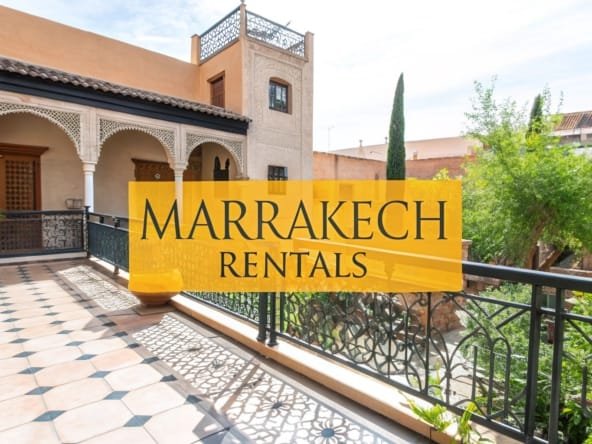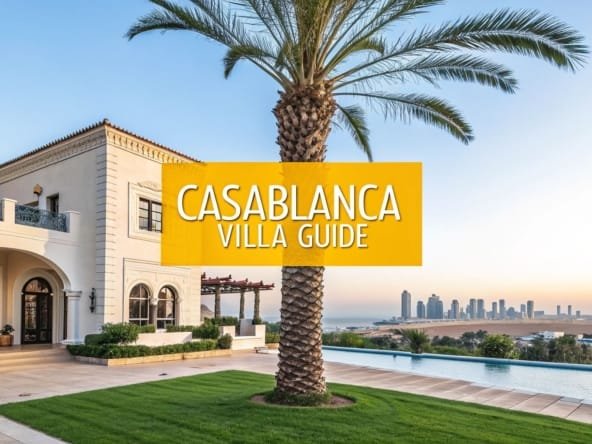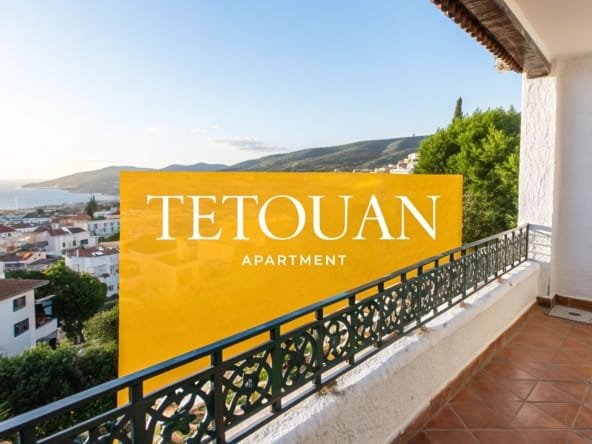Investing in Casablanca's real estate market is a compelling move, not just for its immediate potential but for its long-term stability. The city is the beating heart of Morocco's economy, and this robust financial engine fuels a property market that's both resilient and full of opportunity for savvy buyers and investors alike.
Why Invest in Real Estate in Casablanca?
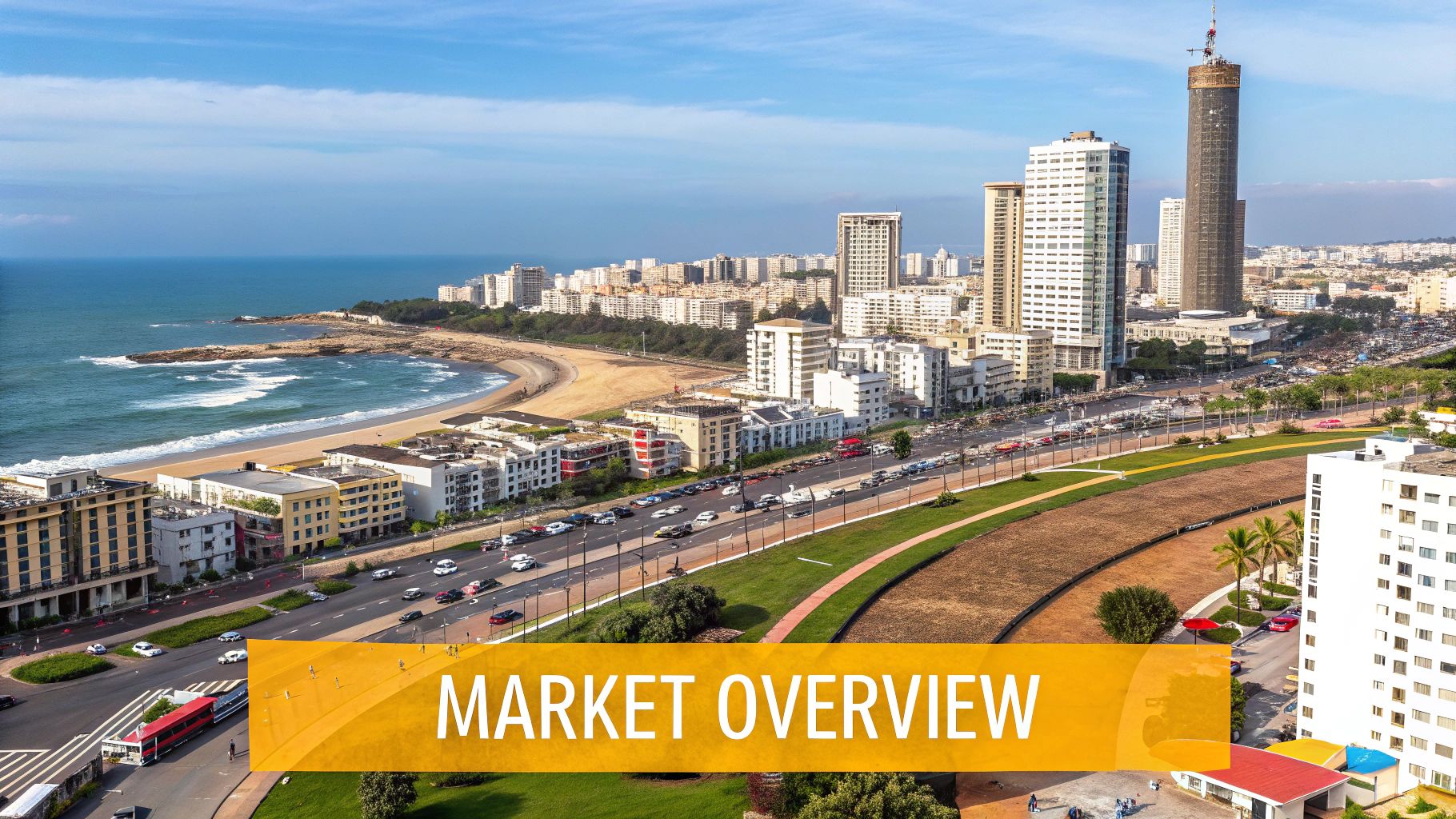
Casablanca isn't just Morocco's largest city; it's the nation's economic powerhouse. Think of it as the country's central nervous system, where commerce, industry, and finance all connect. This powerful economic identity creates a constant, organic demand for property that sets it apart from markets that rely heavily on the tourist trade.
It’s this ceaseless economic activity that draws a steady flow of professionals, families, and entrepreneurs to the city, all looking for opportunities and a place to live. This creates a solid foundation of local demand, making the property market far less vulnerable to the seasonal ups and downs you might see elsewhere. It's this fundamental need for homes and commercial spaces that makes investing in Casablanca real estate such a sound, long-term decision.
The Engine of Growth and Development
Right now, Casablanca is in the middle of a massive transformation, driven by ambitious urban renewal projects. These aren't just minor touch-ups; they are fundamentally reshaping the city's fabric. We're talking about new residential districts, modern business centres, and major infrastructure upgrades like the tramway system, all of which are making the city an even better place to live and work.
This wave of development has a direct, positive effect on property values. The real estate market in Casablanca is seeing a clear rise in prices, reflecting trends in other major Moroccan cities. This upward trajectory is fuelled by strong, persistent demand, and the ongoing development projects only make it more attractive to both local and international buyers.
"Investing in Casablanca real estate is like planting a tree in fertile ground. The city's economic vitality provides the rich soil, while ongoing urban development projects are the sunlight and water that ensure sustained growth and a healthy return."
A Snapshot of Market Strengths
To truly grasp the opportunity, it helps to understand the key drivers propping up the Casablanca real estate market. Several core factors work in harmony to create a very promising environment for anyone looking to buy. For a more detailed breakdown, I highly recommend reading our guide on https://richlionproperties.com/why-casablanca-is-moroccos-hottest-real-estate-hub/.
The following table summarises the core factors driving Casablanca's property market, giving you a quick overview of what makes it so appealing.
Casablanca Real Estate Market at a Glance
| Market Driver | Description | Impact on Real Estate |
|---|---|---|
| Economic Stability | As Morocco's primary economic hub, Casablanca boasts a diverse and resilient economy less dependent on tourism. | Provides a stable demand for residential and commercial properties, reducing market volatility. |
| Urban Development | Massive government and private investment in infrastructure, new neighbourhoods, and public transport. | Increases property values, enhances quality of life, and creates new investment hotspots. |
| Diverse Property Types | A wide selection of properties, from modern apartments and luxury villas to traditional homes and commercial spaces. | Offers a range of options to suit different budgets, lifestyles, and investment strategies. |
| Strong Rental Market | High demand for rental properties from a growing population of professionals, expats, and students. | Delivers consistent rental yields and a reliable stream of passive income for investors. |
In short, the combination of a strong economy, strategic development, property variety, and a robust rental sector makes Casablanca a standout choice for real estate investment in North Africa.
Finding Your Perfect Casablanca Neighbourhood
Choosing where to live in Casablanca isn’t just about finding a property; it's about finding your place in the city's rhythm. Each neighbourhood—or quartier, as we call them—has its own distinct personality. One might be a quiet, leafy residential haven, while another pulses with the non-stop energy of commerce and culture.
Your perfect fit depends entirely on what you’re looking for. Are you after ocean views and an exclusive address? Or maybe you want to be right in the thick of things, with shops and cafes just steps from your door? Getting this choice right is the single most important step in your property journey. Let’s dive into some of the city's most sought-after districts.
The Coastal Elegance of Anfa and Corniche
When people think of prestige in Casablanca, they think of Anfa. This is, without a doubt, the city’s most exclusive address. Hugging the Atlantic coastline, Anfa is defined by its sweeping ocean views, grand villas, and a palpable sense of affluence. The sub-district of Anfa Supérieur, in particular, is synonymous with luxury, home to stunning properties and diplomatic residences.
The lifestyle here is polished and unhurried. Residents have the famous Corniche—a beautiful seaside promenade packed with high-end restaurants and beach clubs—as their playground. Add the prestigious Royal Golf d'Anfa to the mix, and you understand its magnetic appeal.
- Property Types: Dominated by large, luxurious villas with private grounds, sleek high-specification apartment buildings, and exclusive penthouses.
- Best For: High-net-worth individuals, expatriates, and families who value space, security, and a premium lifestyle.
- Atmosphere: Exclusive, serene, and undeniably upmarket.
It's no surprise that property prices in Anfa are the highest in Casablanca. An investment here isn't just about bricks and mortar; it’s about securing a foothold in a premier coastal community.
The Historic Heartbeat of Maarif
Move a little inland from the coast, and you’ll find Maarif, a neighbourhood with a completely different energy. It's dynamic and always buzzing, a place where residential comfort meets commercial convenience. As one of the city’s original European-built districts, it has a classic charm you won't find in newer areas. Today, it’s a central hub famous for its fantastic shopping scene.
The architecture here is mainly classic mid-century apartment buildings. They often have a character and spaciousness that can be hard to find in modern constructions. Its prime central location and excellent transport links make it an incredibly practical choice for professionals and families.
If Anfa is Casablanca's sophisticated face, Maarif is its energetic pulse. It’s where the city’s history and modern ambitions collide, creating a lively, convenient lifestyle with a real sense of community. It's the pragmatic choice for anyone who wants to be at the centre of it all.
The real estate market in Maarif is quite varied, offering everything from charming older flats needing a refresh to fully renovated, modern apartments. It represents a more accessible entry point into Casablanca’s property market than Anfa, without giving up on location. For a deeper dive, looking for a home in Casablanca provides great context on navigating districts like this one.
The Sleek Modernity of Casablanca Finance City and Sidi Maarouf
If you’re drawn to the new, ambitious face of Casablanca, then the area around Casablanca Finance City (CFC) and the Sidi Maarouf business district is where you should be looking. This zone is the engine room of Morocco's economy, attracting global corporations and financial heavyweights.
The property landscape here is a direct reflection of that identity. Think gleaming, contemporary apartment towers packed with amenities like gyms, swimming pools, and 24/7 concierge services. These homes are built for the modern professional who values efficiency and a "lock-up-and-go" lifestyle.
This district is a magnet for young professionals, corporate expatriates, and buy-to-let investors hoping to tap into that exact market. Rental demand is consistently high, fuelled by the sheer concentration of major employers nearby. It may not have the historic soul of Maarif or the coastal charm of Anfa, but it delivers on modern comfort and strategic convenience.
Casablanca Neighbourhood Comparison
To help you get a clearer picture, it’s useful to see these neighbourhoods side-by-side. Each offers a different slice of Casablanca life, at a different price point.
| Neighbourhood | Primary Vibe | Common Property Types | Average Price Range |
|---|---|---|---|
| Anfa & Corniche | Luxurious & Coastal | Villas, High-End Apartments | Very High |
| Maarif | Bustling & Central | Classic Apartments, Renovated Flats | Mid-to-High |
| CFC & Sidi Maarouf | Modern & Corporate | New-Build Apartments, Studios | Mid-to-High |
| Gauthier | Trendy & Chic | Stylish Apartments, Lofts | High |
| Bourgogne | Residential & Calm | Mid-Range Apartments, Family Homes | Medium |
Ultimately, choosing the right neighbourhood comes down to your personal priorities. Whether you're chasing the ocean breeze, the urban buzz, or sleek modern living, Casablanca has a corner that will feel like it was made just for you.
Getting to Grips with Property Types and Market Trends
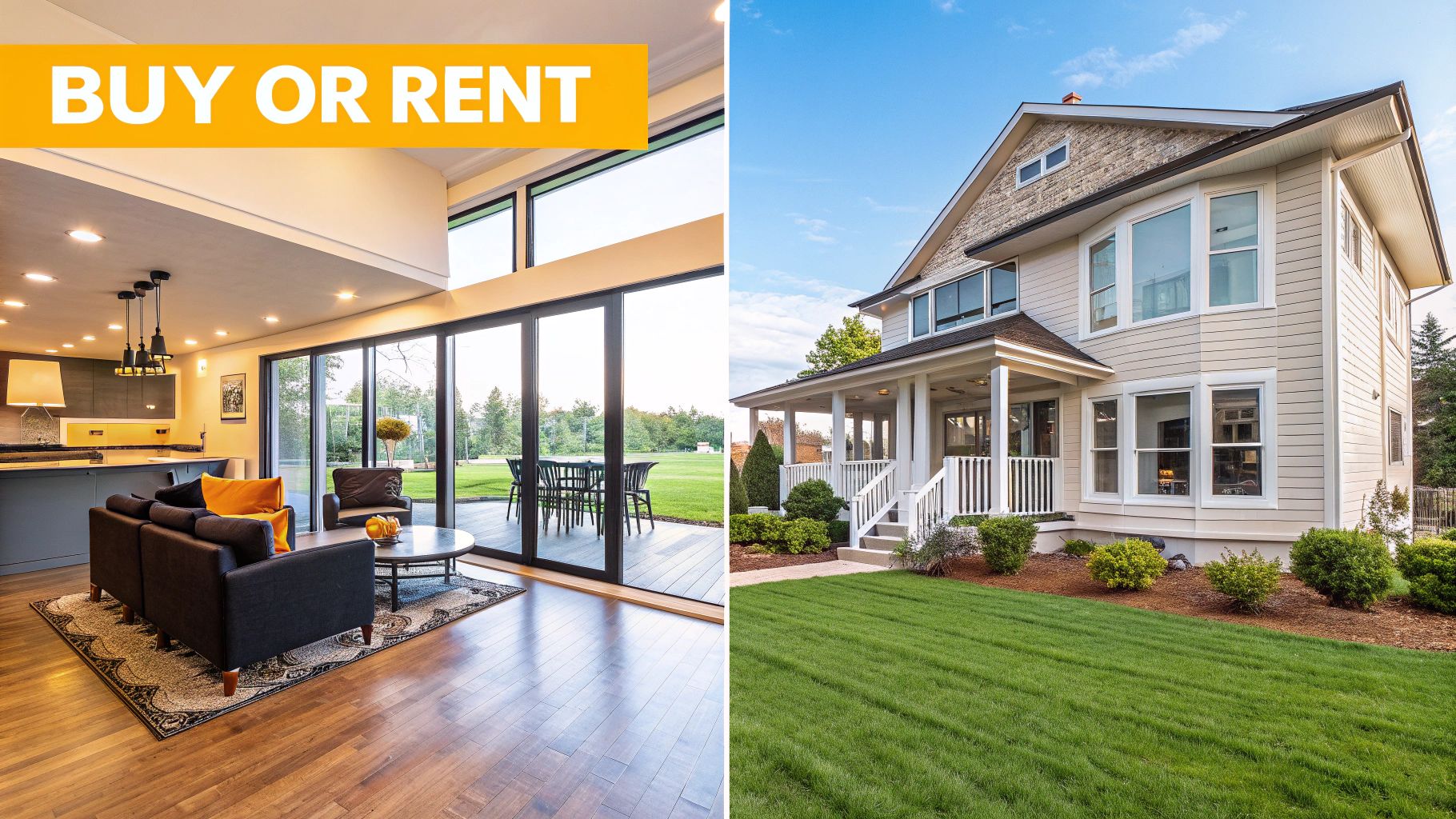
To really understand real estate in Casablanca, you need to look beyond just the neighbourhoods. It’s about getting a feel for the different kinds of properties on offer and the economic currents that are shaping their value. Think of it like putting together an investment portfolio: every asset, whether it's an apartment, a villa, or a riad, has a unique purpose and meets a different need.
A smart investor wouldn't put all their money into one type of stock, and the same logic applies here. A sleek downtown apartment brings convenience and strong rental demand, while a sprawling villa is more of a family legacy and a personal retreat. The trick is to align the property's function with what you want to achieve, whether that's steady rental income, a long-term family home, or a solid capital investment.
All of this is happening as Morocco itself is changing. The country is urbanising at a remarkable pace, a shift that has a direct and powerful impact on housing demand in its economic heartland.
A Look at the Three Main Property Types
As you dive into the Casablanca market, you'll find that most homes fall into one of three main categories. Each has its own distinct personality and is suited to a different kind of owner.
- Modern Apartments: These are the backbone of the Casablanca property scene. You’ll find them everywhere from central hubs like Maarif to brand-new developments in Casablanca Finance City. They offer security, modern conveniences, and easy access to amenities, making them the go-to choice for young professionals, expats, and investors looking for reliable rental returns from a large tenant pool.
- Spacious Villas: Mostly found in exclusive coastal areas like Anfa, villas are the definition of luxury living. These homes offer privacy, generous space, and often come with private gardens and swimming pools. They're a perfect fit for families and affluent individuals who value lifestyle and a prestigious address above all else.
- Traditional Riads: While you'll see more of them in Marrakech or Fes, Casablanca has its own hidden gems, especially in the Old Medina. A riad is a traditional house built around an inner courtyard, creating a peaceful oasis shielded from the city's energy. Taking on a riad renovation can be a hugely rewarding project for someone with a passion for Moroccan heritage, but be prepared for specialised upkeep.
Key Market Trends to Keep an Eye On
The property you choose shouldn't just work for you today; it needs to make sense for where the market is headed tomorrow. A few major trends are shaping the future of real estate in Casablanca.
The biggest driver is the city’s expanding population. By 2030, it's projected that nearly 67.8% of Morocco's population will be living in urban areas. This massive shift, fuelled by the search for jobs and opportunities, puts constant pressure on the housing supply and keeps demand high for both rentals and sales. You can get a broader perspective on this by exploring what’s happening in Morocco's real estate market on a larger scale.
This steady flow of new residents is the engine of the housing market. It creates a baseline of demand that props up property values, making Casablanca real estate a resilient and attractive investment for long-term growth.
This demographic wave is creating two clear patterns. First, there's a growing appetite for modern, amenity-rich residential complexes. Today’s buyers and renters expect more than just a place to live; they’re looking for a complete lifestyle package with security, parking, gyms, and green spaces.
At the same time, the luxury market is holding strong. Despite the practical demand for city living, the allure of exclusive properties like the villas in Anfa hasn't faded. These homes are seen as stable, premium assets that hold their value exceptionally well, attracting both local elites and international investors looking for a safe haven for their capital. By understanding these forces, you can choose a property that isn't just a home, but a smart strategic move.
Your Step-by-Step Guide to Buying Property
Buying a property in Casablanca isn’t something you improvise. Just like in any major global city, there’s a clear path to follow, a series of stages that take you from initial idea to holding the keys in your hand. If you think of it as a roadmap, the whole journey becomes much less daunting.
This guide breaks down the entire process, step by step. We'll walk through the key milestones and introduce the essential people and paperwork that shape the Moroccan property buying experience. Whether it's your first apartment or another villa for your portfolio, this will give you the clarity and confidence to move forward.
Stage 1: Assembling Your Professional Team
Before you even think about scrolling through listings, your first move should be to build your team. This is not a journey you want to take alone; the right professionals will guide and protect you every step of the way.
Your most important ally is a reputable real estate agent (agent immobilier). A good agent does far more than just show you properties. They bring invaluable local knowledge, sharp negotiation skills, and a deep understanding of the city's diverse neighbourhoods. They’re your eyes and ears on the ground.
Just as critical is the notary (notaire). In Morocco, the notary isn't just a lawyer; they are a public officer appointed by the state who acts as a neutral third party. Their involvement is a legal requirement for any property transaction. Their job is to draft the deeds, ensure everything is above board, and secure the title transfer. They don't represent you or the seller—they represent the integrity of the deal itself.
Stage 2: The Preliminary Sales Agreement
Once you’ve found the perfect place and shaken hands on a price, it's time to make it official. The next step is signing the preliminary sales agreement, known in Morocco as the compromis de vente. This is a legally binding contract that locks in the terms of the sale and takes the property off the market.
Think of the compromis de vente as the detailed blueprint for the final purchase. It lays everything out, including:
- The agreed-upon price and a clear payment schedule.
- A detailed description of the property.
- Any conditional clauses (clauses suspensives), like securing a mortgage.
- The target date for signing the final deed.
When you sign this agreement, you'll also pay a deposit, which is typically between 5% and 10% of the purchase price. This sum is held safely in an escrow account by the notary, showing your commitment until the sale is finalised.
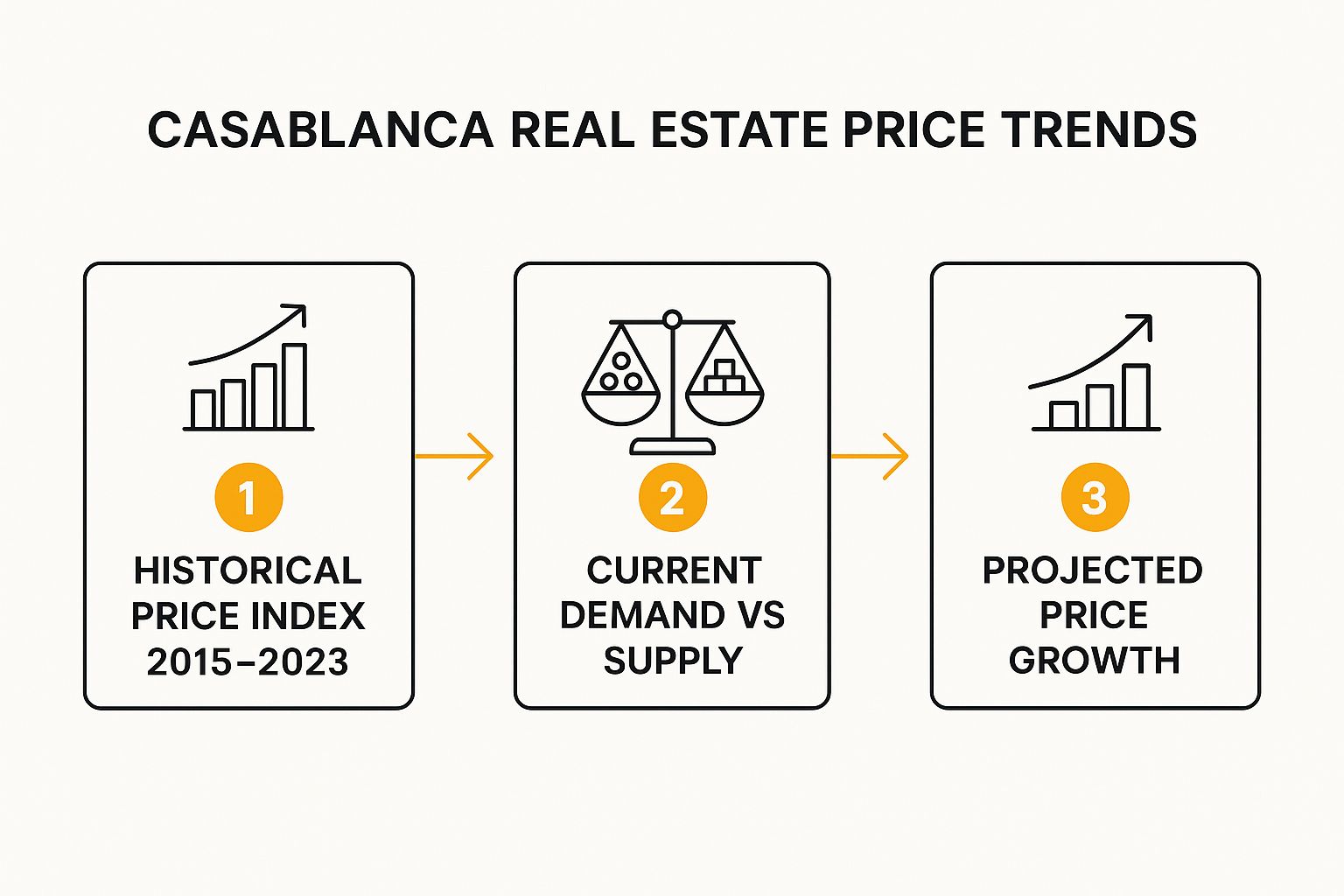
Stage 3: Due Diligence and Finalising the Sale
With the compromis de vente signed, the notary gets to work on the crucial due diligence phase. This is all the behind-the-scenes investigation that protects your investment and ensures a clean transaction.
The notary meticulously checks every legal aspect of the property. This includes:
- Confirming a clear title: They make sure the seller is the undisputed owner and that the property has no liens, debts, or legal claims against it.
- Checking permits and zoning: They verify that the property complies with all local urban planning regulations.
- Settling outstanding taxes: They ensure there are no unpaid property taxes that could become your problem later.
The notary's due diligence is your ultimate safety net. It’s a non-negotiable part of the process that guarantees the property you're buying is legally sound, giving you complete peace of mind and preventing nasty surprises down the road.
Once the notary gives the all-clear, you’ll be called in to sign the final deed of sale (acte de vente). At this meeting, you'll pay the remaining balance of the purchase price, plus any taxes and fees. After the ink is dry, the notary officially registers the sale with the land registry (Conservation Foncière), and just like that, you are the new legal owner.
Uncovering the Investment Potential
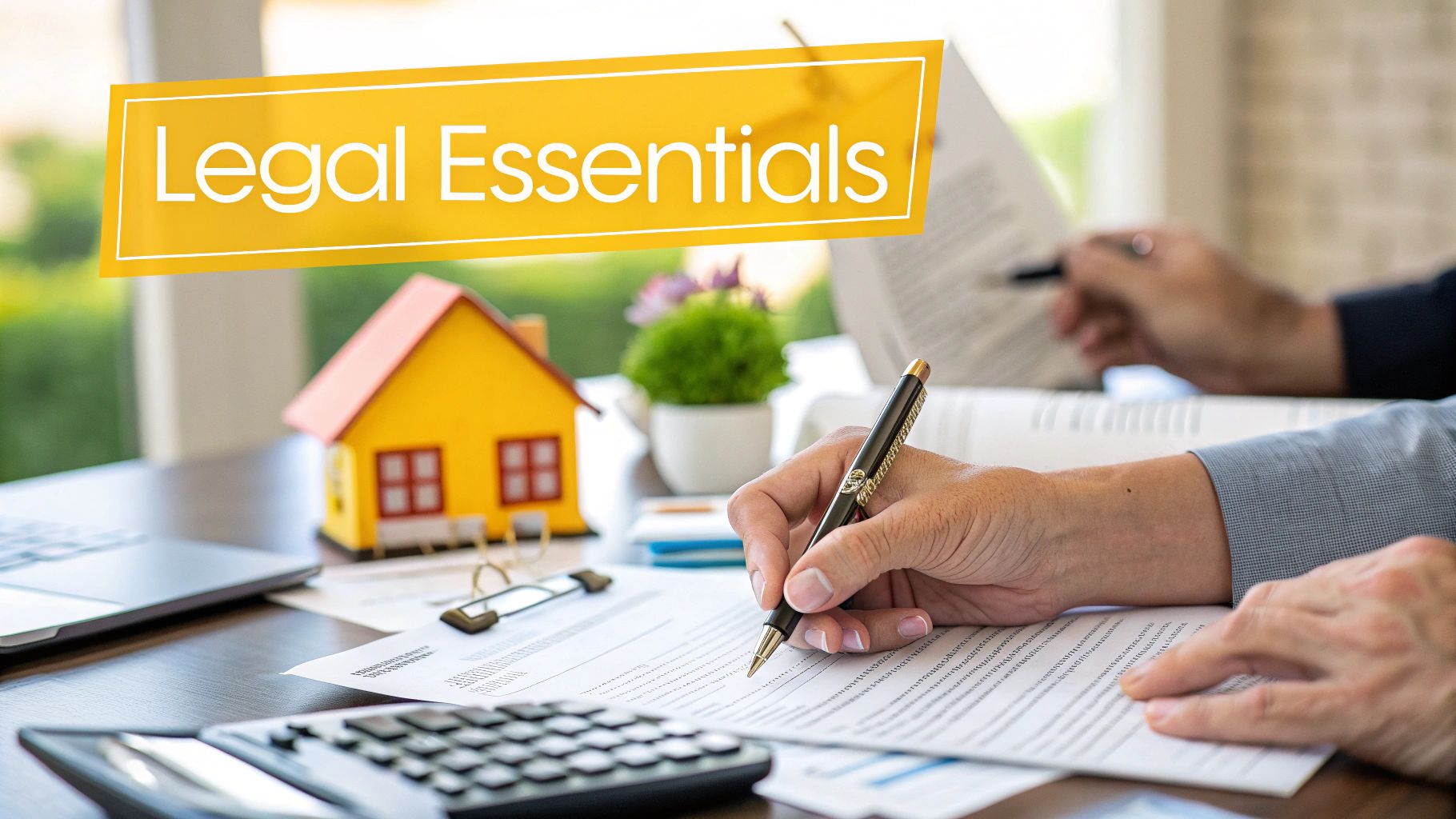
Looking beyond the search for a beautiful home, viewing real estate in Casablanca through an investor's lens reveals its true power. This isn't just about elegant architecture and ocean views; it's a robust engine for building wealth, underpinned by solid economic fundamentals and a clear growth trajectory.
Think of buying property here as investing in a blue-chip company. It’s backed by the full force of Morocco's primary economic hub, which brings a level of stability and predictable demand that's incredibly appealing. That commercial energy means a property in Casablanca is more than just bricks and mortar—it's a tangible stake in one of North Africa's most dynamic economies.
Projecting Future Market Expansion
The outlook for Casablanca's property sector is exceptionally bright. Morocco’s real estate market is forecast for steady growth, with projections pointing to an average annual expansion of 4.69% between 2024 and 2029.
By 2029, the market's total value is expected to reach an impressive US$2.05 trillion, with the residential segment alone set for a 4.99% annual increase. These figures highlight the significant opportunities waiting for savvy investors.
This isn't just speculation; it's growth driven by tangible factors. Ongoing urban development, a rising middle class, and Casablanca’s magnetic pull for both local talent and international business all fuel this positive forecast. For an investor, this data offers a clear, evidence-based reason to get into the market.
Investing in Casablanca is a strategic move grounded in economic reality. The market's upward trend is fuelled by genuine growth and development, not just fleeting tourism, positioning it as a reliable vehicle for long-term capital appreciation.
Analysing Key Investment Metrics
To make a truly informed decision, you need to look at key metrics like rental yields. In Casablanca, these can be quite attractive, particularly in neighbourhoods with high demand from professionals and expatriates.
- High-Demand Areas: Districts like Maarif and the areas around Casablanca Finance City (CFC) consistently show strong rental demand. Their central locations and proximity to major business hubs make them perennial favourites.
- Luxury Segment: Upscale neighbourhoods such as Anfa present premium rental opportunities, attracting a clientele of diplomats and corporate executives looking for high-end living standards.
Furthermore, major infrastructure projects—like the expanding tramway system and new business parks—have a direct and positive impact on property values in nearby areas. An investment close to these developments can lead to significant capital gains over time.
By carefully analysing these metrics, you can pinpoint properties that offer that perfect blend of steady rental income and strong potential for appreciation. If you're serious about this path, it's worth exploring the fundamentals of property investment in Morocco to build a solid strategy from the ground up.
Getting the Paperwork and Finances in Order
Buying property in Casablanca is more than just finding the right place; you also have to navigate the legal and financial side of things. It might sound daunting, but it's actually a very clear, step-by-step process designed to protect everyone involved. Think of it less as a hurdle and more as a roadmap to securing your new home or investment.
Before you get too attached to a property's list price, remember there are several other costs you'll need to factor in. Getting these straight from the beginning saves you from any unpleasant surprises down the road and lets you budget with real confidence.
The biggest additional cost will almost always be the notary fees and registration duties. In Morocco, the notaire (notary) is a neutral, state-appointed official who handles the legalities of the sale. Their fees, plus the government taxes required to register the property in your name, will typically add up to about 6-7% of the purchase price.
Understanding the Key Costs
When you're putting together your budget, make sure you account for these standard expenses. Every property deal in Casablanca includes them.
- Property Registration Tax (Droits d'Enregistrement): This is the main government tax you pay to transfer the property's ownership.
- Land Registry Fee (Conservation Foncière): This is the fee for officially logging your ownership in the land registry, which is what gives you a secure legal title to the property.
- Notary Fees (Frais de Notaire): This covers the notary's work—drafting the deeds, doing the necessary background checks, and making sure the entire deal is above board.
- Annual Property Tax (Taxe d'Habitation): Once the property is yours, you’ll be responsible for this yearly tax, which is calculated based on the property’s rental value.
If you're an international buyer, you'll find the process is surprisingly open. Moroccan law allows foreign nationals to buy property quite freely. The only major restriction is on purchasing agricultural land.
One of the most important things for an overseas investor to understand is the concept of capital repatriation. Morocco allows you to transfer the full proceeds of a sale back to your home country, but there's a catch: your initial investment must have been properly registered with the Foreign Exchange Office when you first brought the funds in. Get this right, and your investment stays flexible.
How to Get a Mortgage in Morocco
Many buyers, both Moroccan and foreign, look to local banks for financing. The mortgage market here is mature and competitive, with plenty of different loan options available. When you apply, you'll need to pull together a solid dossier of your financial documents.
Here's what most banks will ask for:
- Proof of Identity: Your CIN (national ID card) or passport.
- Proof of Income: Recent payslips, a contract of employment, or if you're self-employed, your business's financial records.
- Bank Statements: Typically from the last three to six months to demonstrate a stable financial history.
- Preliminary Sales Agreement (Compromis de Vente): This is the initial, signed agreement for the property you're buying.
Getting a handle on the legal and financial side of real estate in Casablanca is all about preparation. Once you understand the costs and the steps involved, you'll be in a much stronger position to make a smart, secure investment in this incredible city.
Common Questions About Casablanca Real Estate
Diving into Casablanca’s real estate market always brings up a few questions, whether you're a first-time buyer or an investor from overseas. Getting a handle on these common queries is the best way to move forward with confidence.
One of the first things people ask is, "Can a foreigner actually buy property here?" The answer is a clear and simple yes. Moroccan law is very open to international buyers, allowing them to purchase titled properties with almost no restrictions. The only real exception is agricultural land, which is reserved for Moroccan citizens.
This welcoming approach means that buying an apartment or a villa in Casablanca is a pretty straightforward affair. You'll have the same rights and protections as any local buyer, so you can be sure your investment is secure.
What Are the Main Closing Costs?
The next big question is always about the extra costs. Beyond the price tag on the property, what else do you need to budget for? These are the closing costs, and knowing them upfront will save you from any last-minute surprises.
Think of closing costs as the final administrative hurdle to clear before the property is truly yours. They might feel like an extra expense, but these fees are what guarantee your ownership is legally solid, properly registered, and free of any old claims. It's the price of total peace of mind.
As a rule of thumb, you should budget for closing costs to be around 6-7% of the property’s purchase price. This percentage typically breaks down into three main parts:
- Registration Duties: This is the main government tax for transferring the property title into your name.
- Notary Fees: You're paying the notary for their crucial legal work, including all the due diligence.
- Land Registry Fees: This fee covers the official recording of your title at the Conservation Foncière, making your ownership official.
Factoring these costs into your budget from the start makes for much smoother financial planning.
Can I Get a Mortgage in Morocco?
Financing is another hot topic. The good news is that both residents and non-residents can apply for a mortgage from Moroccan banks. The banking scene here is quite competitive, so you’ll find a decent range of loan products to choose from.
To get the ball rolling, you’ll need to pull together the usual financial documents—proof of income, recent bank statements, and a copy of the preliminary sales agreement (compromis de vente). Lenders will look at your financial health to decide if you're eligible and how much they’re willing to lend. A well-organised application file can make the whole process much faster and easier.
Ready to explore the opportunities in Casablanca's dynamic property market? The team at Rich Lion Properties offers expert guidance and local insights to help you find the perfect property. Visit our website to start your journey.

